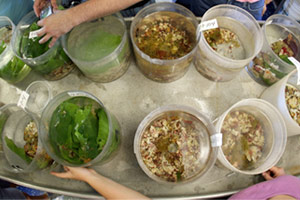Drugs from the Sea

A primary goal of the Harbor Branch Marine Biomedical & Biotechnology Research Program is to discover marine natural products with utility as medicines or as tools to allow us to better understand the molecular basis of disease.
Natural products, or secondary metabolites, are small, organic molecules produced by organisms. Unlike primary metabolites such as sugars, fats or proteins, these metabolites are not essential to sustain life. Because organisms must expend energy to produce natural products, however, the compounds are thought to confer an evolutionary advantage to the producing organism. For example, if a sponge makes a compound that is toxic to predators, or tastes bad, that sponge may be protected from being eaten, and will have an advantage over one that does not produce the compound. In addition to blocking predation, natural products can have many different functions within the producing organism: They might have roles in larval settlement, spawning or as antimicrobial agents, to name just a few. Natural products are inherently bioactive, and most researchers feel that the structures have evolved over time to provide exquisite biological activities. Humans and organisms such as sponges, soft corals and bacteria share similar biochemistry, and compounds that might have one use in sponges might have a totally different use in humans. We can take advantage of this similarity in biochemistry to develop medicines useful in the treatment of human diseases.
To this end, our program collects unusual marine organisms — many of them from deep-water habitats — that are the source of novel natural products for our program. We focus on marine plants, invertebrates and the micro-organisms that live in association with them.
Harbor Branch's drug discovery program primarily looks for treatments for cancer and infectious disease, but we also have collaborations with scientists working on malaria, tuberculosis, neurodegenerative disease and inflammation.
